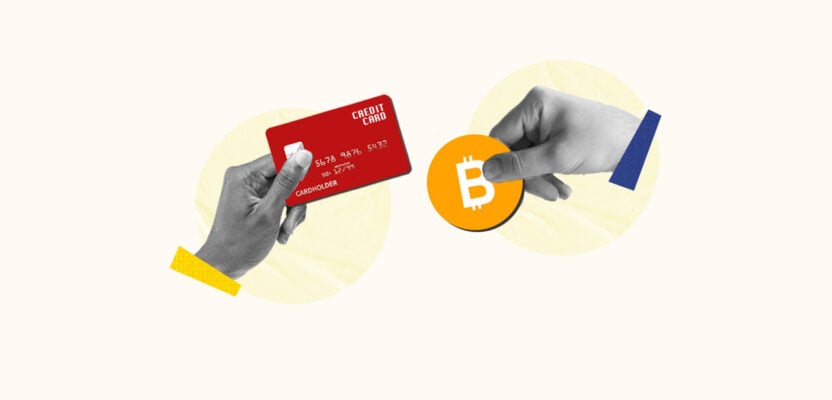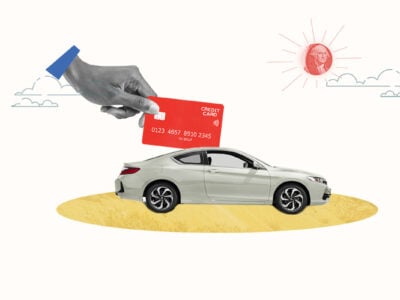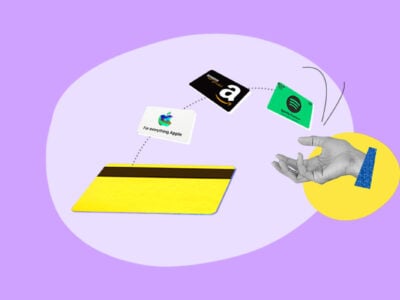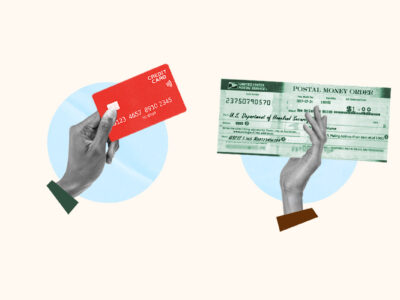If you’re looking to get into crypto, you might be wondering whether you can buy it with your credit card. The answer is yes; regardless of whether you’re buying Bitcoin, ETH, Dogecoin, or any of the other types of cryptocurrencies out there, it’s perfectly legal to do it with your card.
However, even though it’s possible to buy crypto on credit, it’s almost never a good idea. What’s more, some crypto exchanges and credit card companies prohibit this type of transaction.
Below, we’ll list the companies that allow you to purchase crypto with your credit card—and why we recommend never actually doing it, even when it’s allowed.
Table of Contents
Which crypto exchanges accept credit card payments?
Generally, when you buy crypto, you’ll do it through a crypto exchange. Most crypto exchanges take credit card payments, but a few don’t.
The table below lists most of the major crypto exchanges that are available in the US, whether they take credit cards, and if so, whether they’ll hit you with any added fees.
Credit Card Policies of Major Crypto Exchanges
| Exchange | Accepts credit cards? | Fees |
|---|---|---|
| Binance | Yes | 3.5% or $10, whichever is higher (source) |
| CEX.io | Yes (Visa and Mastercard only) | 2.99%–3.99%, plus variable service fee (source) |
| Coinbase | Not currently, although you may be able to use a credit card that you previously linked when it was allowed (source) | N/A |
| Coinmama | Yes | 4.99% (source) |
| Coinsmart | Yes | Up to 6% (source) |
| Crypto.com | Yes (source) | Unclear; Crypto.com did not respond to request for comment |
| Gemini | No (source) | N/A |
|
|
||
Which credit card issuers allow you to buy crypto?
Many credit card companies also ban or restrict cryptocurrency purchases. Unfortunately, figuring out which companies have these restrictions isn’t easy—credit card issuers frequently change their policies about this (often very quietly, without publicizing the change).
To demystify things, we contacted the 10 largest credit card companies in the US and asked them about their crypto policies. We’ve listed their answers below. This table is current as of November 2022.
Crypto Policies of Major Credit Card Issuers
| Credit card issuer | Lets you buy crypto with a credit card? | Comments |
|---|---|---|
| American Express | Yes | Noted that the merchant needs to accept Amex cards. You cannot transfer funds from your crypto account directly to an Amex bank account. |
| Bank of America | No | None |
| Barclays Bank | No | This policy was put in place on February 21, 2018; before that, Barclays allowed you to buy crypto with a credit card. |
| Capital One | No | None |
| Chase | No | Chase's representative noted that you can buy crypto with a Chase debit card or ACH bank transfer. |
| Citi | No | None |
| Discover | No | Discover's rep cited the "potential risks" of crypto purchases as their rationale for this policy. |
|
|
||
As you can see, currently only American Express allows crypto purchases on their cards.
Note that, because cryptocurrency is still so new, credit card companies don’t always apply their policies consistently. It’s possible you’ll find a crypto exchange that you’ll be able to use your credit card at, even if your issuer doesn’t allow crypto purchases.
However, we strongly discourage you from buying crypto with your card if it’s against your card issuer’s terms. If they catch you, they might hit you with various penalties, all the way up to punitively closing your account.
What’s more, even if you get away with it, charging crypto to your card comes with serious downsides, which we’ll explain in the next section.
Why you should never buy crypto with your credit card
Although it’s sometimes possible to use a credit card to purchase BTC and other crypto, we strongly discourage it. Using your credit card is significantly more expensive than your other options.
As shown in the first table above, many crypto exchanges will hit you with an added fee when you use your card. What’s more, your credit card issuer will probably also hit you with a fee of their own.
Why do credit card issuers charge fees for buying crypto?
Most credit card companies treat crypto purchases as a type of credit card cash advance. This is a transaction where you get cash from your credit card instead of buying a product or paying for a service.
Most of the time, taking out a cash advance means borrowing money from an ATM with your credit card, but since crypto is considered a type of cash, it counts as well.
Cash advances are expensive
Credit card issuers want to discourage you from taking out cash advances. They’re meant for emergencies, but they’re not really what credit cards are designed for.
This means that cash advances come with a lot of downsides, including:
- Added fees: As mentioned, many credit cards feature cash advance fees, which are often set at 5% of the transaction amount or $10 (whichever is higher). You’ll have to pay this fee any time you buy crypto.
- Higher interest rates: Cash advances often feature a higher interest rate than other transactions. Interest will also usually start accruing immediately (instead of after a substantial grace period, as with other purchases).
- No rewards: If you have a rewards credit card, cash advances will almost certainly be exempted from your rewards program. It would be nice if you could earn airline miles or cash back by investing in crypto, but unfortunately, you probably can’t.
The upshot is that when you pay for cryptocurrency with your credit card, you’ll end up paying more (in fees and interest) than you would if you paid with cash, and you’re not going to earn any rewards to compensate for the added expense.
Other reasons not to buy crypto with a credit card
Buying crypto on credit also comes with several other downsides:
- More fees: In some cases, you’ll get hit with yet more fees. In particular, if the crypto exchange you use is based outside the US, you’ll probably have to pay a foreign transaction fee (usually 1–3%). This applies to many popular exchanges—for instance, Crypto.com is based in Singapore.
- Risk of scams: While using major crypto exchanges is generally safe, smaller, lesser-known ones might steal your credit card information. Your info also could get compromised in a data breach, even if you stick to reputable companies.
- Credit card debt: Any time you make an investment, whether it’s in the stock market or in cryptocurrency, there’s a chance that you’ll lose your money. Unless you can pay off the purchase immediately, buying crypto on credit can trap you in a dangerous spiral of debt.
- Credit score damage: Making large purchases with your credit card can lead to a drop in your credit score. That’s because taking on too much debt suggests irresponsible financial behavior. Damaging your credit score makes it harder to qualify for new credit accounts (such as a new credit card or a mortgage), and can even interfere with your ability to get a job or an apartment.
As you’ve probably gathered, buying crypto with your credit card comes with a lot of downsides and no real upside. It means paying more money, taking on more risks, and getting less for it.
Rather than borrowing money on credit to complete your crypto purchase, it’s better to pay with money that you already have. Most crypto exchanges will let you do this with your debit card, a wire transfer, or by linking your bank account to your crypto exchange account.






